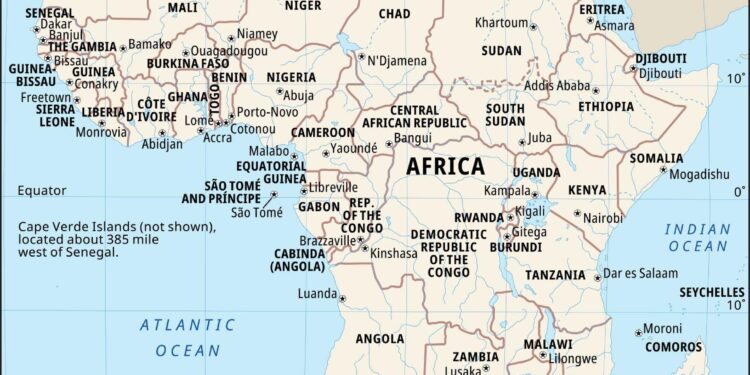Economic Resilience Urged for Africa Amid US Tariffs
As global trade dynamics shift in response to escalating tensions, Africa finds itself at a crucial crossroads. With the United States intensifying tariffs on various imports, concerns are mounting regarding the potential impact on the continent’s economic stability and growth prospects. Analysts and policymakers are calling for enhanced economic resilience strategies across African nations to mitigate risks and seize emerging opportunities in the evolving global marketplace. This article delves into the implications of US tariff policies on Africa, the responses required from its governments, and the pathways toward sustainable economic fortification amid external pressures.
Enhancing Trade Partnerships to Counteract US Tariffs on African Exports
In light of increasing US tariffs, African nations are urged to bolster their trade partnerships to mitigate the impact on their exports. By diversifying their trade networks beyond traditional markets, African countries can enhance their economic resilience. Key strategies include:
- Strengthening intra-African trade: Initiatives like the African Continental Free Trade Area (AfCFTA) can serve as a foundation for enhanced regional economic cooperation.
- Exploring alternatives with emerging markets: Countries such as India, Brazil, and those in Southeast Asia are presenting new opportunities for African goods and services.
- Investing in strategic commodities: Shifting focus towards high-demand exports like minerals, agricultural products, and renewable resources can meet global needs while reducing dependency on the US market.
Moreover, regional partnerships can bolster negotiating power on the international stage. Collaborative efforts to improve infrastructure, such as transport and logistics, will facilitate smoother trade flows. The following table outlines potential partnerships and their targeted sectors:
| Partner Country | Target Sector |
|---|---|
| India | Agriculture |
| Brazil | Energy |
| Indonesia | Textiles |
| Turkey | Construction |
Investing in Local Industries: A Pathway to Economic Self-Sufficiency
Investing in local industries presents a dynamic approach for African nations striving for economic self-sufficiency amid external pressures such as tariffs imposed by larger economies. By focusing on home-grown production capabilities, countries can create a robust economic landscape that minimizes dependency on imports and enables greater control over their own markets. Key advantages of supporting local industries include:
- Job Creation: Local industries contribute significantly to employment rates, reducing the unemployment gap.
- Innovation and Skill Development: Investing in local businesses fosters innovation and enhances the skill set of the workforce.
- Community Resilience: Strengthened local economies lead to more resilient communities that can withstand global economic fluctuations.
Furthermore, by harnessing local resources and talents, African countries can develop unique products that cater to regional needs and tastes. Governments, in collaboration with private sector stakeholders, could implement policies that incentivize investment in local manufacturing sectors. Such strategic moves might also include providing financial support, improving infrastructure, and ensuring access to essential technologies. The following table illustrates potential sectors that hold promise for local investment:
| Sector | Investment Potential | Impact on Economy |
|---|---|---|
| Agriculture | High | Food security and export growth |
| Textiles | Moderate | Job creation and reduced imports |
| Renewable Energy | High | Sustainable development and energy independence |
Strengthening Policy Frameworks for Sustainable Growth and Resilience
As Africa grapples with the repercussions of increased US tariffs, there is a compelling need for governments across the continent to bolster their policy frameworks aimed at fostering sustainable growth and enhancing economic resilience. This challenge calls for innovative approaches that prioritize diversification and the cultivation of local industries. Policymakers must act swiftly to:
- Enhance intra-African trade: Implementing trade agreements that promote regional cooperation and reduce barriers can significantly boost local economies.
- Invest in infrastructure: Upgrading transportation and communication networks is essential to facilitate smoother trade and improve market access.
- Encourage investment in technology: Fostering an environment conducive to technological advancement can enhance productivity and competitiveness.
Furthermore, strengthening regulatory frameworks is crucial for creating a business environment that is attractive to both domestic and foreign investors. Governments should focus on policies that support small and medium-sized enterprises (SMEs) as they are often the backbone of economic resilience. A comparative analysis of various sectors’ performance may provide insight into which areas warrant additional support:
| Sector | Current Contribution to GDP (%) | Potential for Growth (%) |
|---|---|---|
| Agriculture | 15 | 30 |
| Manufacturing | 10 | 25 |
| Technology | 5 | 40 |
By applying a targeted approach to enhance these sectors, African nations can create a more robust and resilient economic landscape amid global uncertainties. Emphasizing collaboration between governments, private sectors, and civil society will be fundamental in achieving these objectives and ensuring long-term sustainability.
Insights and Conclusions
In conclusion, the ongoing trade tensions between the United States and China present both challenges and opportunities for African economies. As tariffs reshape global trade dynamics, the call for enhanced economic resilience has become more urgent than ever. African nations must navigate these complexities by diversifying their trade partnerships, investing in local industries, and fostering innovation. By leveraging their unique resources and potential for growth, African countries can not only mitigate the impacts of external pressures but also position themselves as key players in the global economy. As the landscape continues to evolve, the emphasis on collective resilience will be vital for achieving sustainable development and economic stability across the continent.















How Trump’s Tariffs Transformed a Mexican Businessman into a Grateful Ally